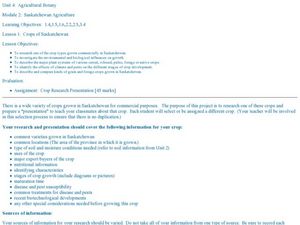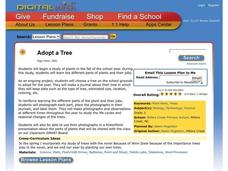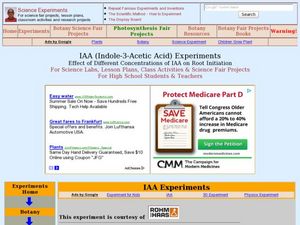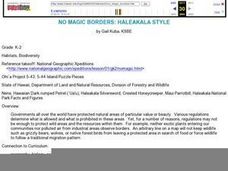Worchester Polytechnic Institute
Interactive Laboratory Activities for Secondary Education
Do you think the lab smells like rotten eggs? Sorry to hear about your sulfering. A set of five experiments covers many different topics including seasons, gravity, food, precipitation, and photosynthesis. Though not presented as a...
Curated OER
WET Science Lesson #11: How Light Affects Water
Scientists listen to the story of Wadja Egnankou who works to save African mangrove forests. They experiment with refraction and the introduction of particulate matter to water. They conclude with creative writing about the need for a...
Curated OER
Field Biology
Students work with 4th and 5th graders at Cascade Brook School in Farmington, to teach them skills in wildflower and fern identification, and then to help them implement a nature trail, which is accessible to the greater Farmington...
Curated OER
Crops of Saskatchewan
Students research one of the commercial crops grown in Saskatchewan. In this agriculture lesson, students discover locations, characteristics, common problems, and biotechnological developments related to the crops of Saskatchewan.
Curated OER
Adopt a Tree
Students adopt tress on their school campus for scientific observation purposes. In this tree science lesson, students adopt a tree at their school, observe the season changes for the tree, and create a PowerPoint presentation about the...
Curated OER
Fiber of Life
Students examine the importance of plants to individuals and society through a multi-discipline set of activities. They observe and draw different leaf structures and then create a book about trees and photosynthesis. They explore ways...
Curated OER
Genetically Modified Foods in Perspective
Students research the concept of genetically modified foods. The purpose of the research is to increase science content knowledge and comprehension of the controversy surrounding the subject.
Virginia Department of Education
A Designed Organism
How can you encourage pupils to demonstrate creativity while still meeting the objective of applying technical knowledge? This activity is your answer! Scientists will create an imaginary creature and prepare a graphic organizer with...
Curated OER
Active Ingredient Screening Test for Plants
Students explore the growth of bacteria. They determine if various plant materials contain active ingredients that inhibit the growth of bacteria. In addition, they complete a student data sheet.
Curated OER
Cell Structure and Function
Students compare the organelles present in plant and animal cells. For this biology lesson, students create an analogy to easily remember their assigned organelles. They also research their function and write a creative story.
Curated OER
Comparative Stream Quality
Students examine water quality on a nearby stream. They collect water samples and test for various factors, including any contamination from the treatment plant, and present their information in a Powerpoint presentation.
Curated OER
How Much Water Does A Tree Transpire In A Day
Students engage in a lesson of investigating the amount of water that is transpired in a one day cycle. They conduct research to find the purpose of transpiration and find information to explain the value to a plant and explain how...
Curated OER
Nitrogen Fixation, OR What a Gas!
Students gain skill in the design, implementation, and reporting of a scientific research project using the scientific method. They set up an experiment to determine the effect of adding the Rhizobium bacteria to one group of legume...
Curated OER
Auxin: Indole-3-Acetic Acid (AAA), A Hormone with Diverse Effects: Synthesis and Applications
High schoolers synthesize Indole-3-Acetic acid from 3-indolylacetonitrile. In this biochemistry lesson, students determine the effect of different concentrations of IAA on lima beans. They explain how hormones help in plant development.
Curated OER
Understanding How Potatoes Grow
Second graders make a KWL chart and brainstorm what they need for the project of growing potatoes. They choose one potato and plant it in water or peat moss cups and choose a location in which meets the needs of the plants and make their...
Curated OER
The Census of Marine Life
Learners explain diversity and abundance in marine life. In this oceanic biology lesson, students collect information for various geographical areas to collect a census of marine life.
Curated OER
Digital Mitosis and Claymation
Take mitosis and meiosis out of the biology textbook and onto the screen! An innovative class project prompts young biologists to create an animation movie using clay, showing the phases involved in mitosis or meiosis by...
Curated OER
No Magic Borders: Haleakala Style
Young scholars discuss borders and boundaries. They discuss pollution and the fact that boundaries cannot stop pollution and that pollution affects even protected wildlife and plants. They participate in an activity in which they must...
Curated OER
Investigation of Meiosis in Common Plants and Animals
Students witness various stages of mitosis through preparing onion root tip slides. With teacher guidance, they learn a great deal through the hands-on process of preparing the slides themselves.
Curated OER
Capillary Action And Transpiration
Students engage in a study of the concepts of biology with plants known as capillary action and transpiration. They conduct a simple experiment to demonstrate the concept. The lesson includes a background discussion led by the teacher...
Curated OER
Allelopathy Experiments
Students explore how allelopathy works in plants. In this botany lesson, students explain how this phenomenon affect other organisms. They read and analyze an article about allelopathy and discuss its flaws.
Curated OER
Growing Plants with Worm Castings
Learners test worm castings for content and use them to grow seeds. They hypothesize which castings best sustain seed growth. They observe growing plants to test their hypotheses. Later they graph their data.
Curated OER
Nature Superfish
Students study the behavior or ocean animals called billfish. In this life science lesson, students create their own documentary about a local animal. They share their videos with the entire school.
Curated OER
WET Science Lesson #3: Comparison of Aquatic and Terrestrial Plants
Elementary life science explorers compare and contrast aquatic and terrestrial plants (elodea and soybeans) in a Venn diagram. Some background information is provided to support direct instruction, and general instructions are provided...

























